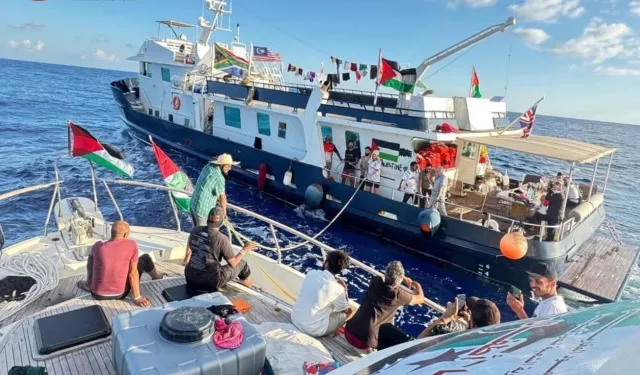The Global Sumud Flotilla entered the high-risk zone on Tuesday as Israel prepared a military operation to intercept the civilian fleet bound for Gaza, according to organizers.
The flotilla declared it had entered the “high-risk zone” yesterday; waters where previous missions were intercepted, raided, or attacked by Israeli forces. Organizers vowed to proceed despite what they described as “Italian intimidation tactics and Israeli threats.”
Flotilla participants reported increased surveillance by Israeli drones and encounters with unidentified vessels that approached, lingered, and retreated. According to organizers, an Israeli warship and multiple patrol boats surrounded the lead vessels, Alma and Sirius, jamming communications and forcing those aboard to activate emergency protocols, including discarding their phones into the sea.
Italian authorities warned that a naval frigate accompanying the mission would soon broadcast an ultimatum offering participants a chance to disembark and return to shore.
But the convoy of over 40 civilian vessels and 500 activists, including lawmakers and human rights lawyers, vowed to continue, according to a press release posted to the flotilla’s Telegram channel earlier this morning.
“It is likely that Israel will attack us tonight. All signs point to that,” said Italian spokesperson Maria Elena Delia in an Instagram video.
Italy’s Ministry of Defense confirmed it would pull its naval escort once the flotilla came within 150 nautical miles of Gaza. PM Giorgia Meloni urged activists to abandon their mission, claiming it could obstruct US President Donald Trump’s proposed reconstruction initiative for the region.
In their press release, flotilla organizers dismissed Italy's stance as “complicity in obstruction” and reiterated their intent to reach Gaza.
Israeli media described the planned operation to stop the flotilla as “complex”, which is expected to culminate this evening. Reports indicate that Israeli forces intend to board the boats, detain all on board, and transfer them to Ashdod port.
Reports said 600 Israeli police officers would participate. Those refusing deportation would be brought before a special court set up inside Ketziot Prison.
Last week, Israeli army spokesperson Colonel Effie Defrin said the navy was fully prepared to intercept the fleet but acknowledged the logistical challenge posed by the sheer number of vessels.
Six flotilla vessels were attacked by Israeli drones last week, which fired projectiles and stun grenades, damaging boats but causing no injuries. Italy and Spain responded by dispatching naval warships to "escort" the convoy.
Israel’s Foreign Ministry warned the ships would be blocked from entering what it called a “combat zone,” accused the campaign of Hamas affiliation, and referred to it as the “Hamas flotilla.”
Organizers condemned the statements as incitement and part of a broader pattern of obstructing aid to Gaza, and demanded intervention from the international community.
Israel’s blockade has plunged Gaza into a humanitarian catastrophe. According to the Palestinian Ministry of Health, more than 66,000 Palestinians have been killed and 168,000 injured since the war began. Starvation induced by the blockade has killed at least 453 people, including 150 children.
